[Newsbits] 27-29.02.2024: Krutrim, Juice Jacking, 10,000 Genomes Project & More
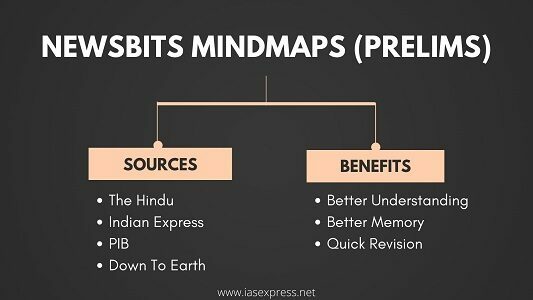
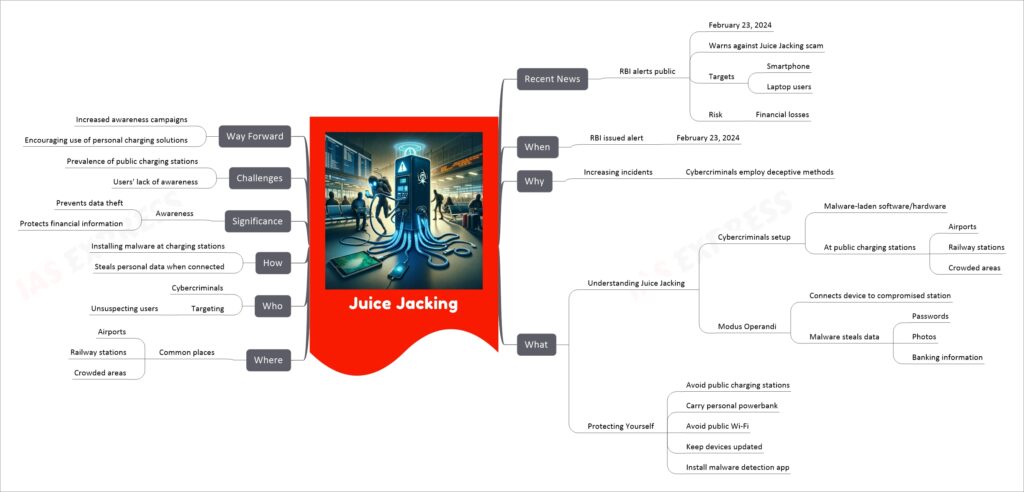
Juice jacking is a cyberattack technique warned against by the Reserve Bank of India (RBI) where cybercriminals use malware-laden charging stations to steal sensitive information from devices such as smartphones and laptops. This scam typically takes place in public areas with free charging stations, like airports, railway stations, and crowded places. The RBI advises the public to avoid using public charging stations, carry personal power banks, avoid public Wi-Fi, keep their devices updated, and use malware detection apps to safeguard against these attacks. This alert aims to raise awareness among the public about the risks of juice jacking and to encourage preventative measures to protect personal and financial information.
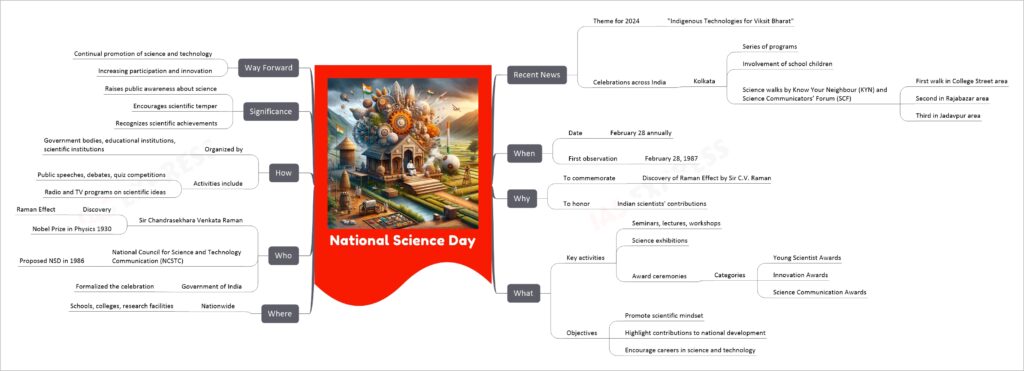
National Science Day is observed in India on February 28th each year to honor Sir C.V. Raman for his discovery of the Raman Effect, and to recognize the contributions of Indian scientists to the field of science. The day aims to promote a scientific mindset among the public, highlight the importance of science in national development, and encourage young people to pursue careers in science and technology. The theme for National Science Day 2024 is “Indigenous Technologies for Viksit Bharat,” focusing on the importance of homegrown innovations. Celebrations include seminars, lectures, workshops, science exhibitions, and the presentation of awards to individuals and organizations for their contributions to science and technology in India.

The International Astronomical Union (IAU), established in 1919, plays a pivotal role in promoting and safeguarding astronomy through international cooperation. It addresses significant challenges such as the impact of satellite constellations on astronomical observations, highlighted by recent actions like the UN addressing this issue and the establishment of a new center to mitigate these effects. The IAU also fosters global engagement in astronomy, as seen in activities like the naming of exoplanetary systems and hosting the General Assembly in Africa for the first time, emphasizing accessibility, impact, and sustainability. With over 13,500 members from more than 100 countries, the IAU encourages collaborative efforts among astronomers, industry, and policymakers to overcome challenges and innovate in observation and data analysis techniques, ensuring the continued exploration and understanding of the cosmos.
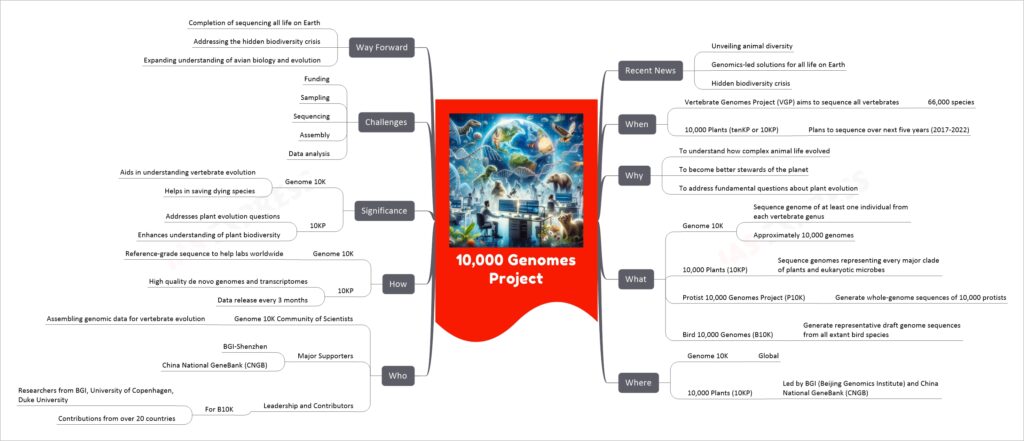
The “10,000 Genomes Project” refers to several ambitious initiatives aimed at sequencing the genomes of a wide range of species across the animal kingdom, including vertebrates, plants, and protists, to better understand biological diversity and evolution. These projects, such as the Genome 10K for vertebrates, the 10,000 Plant Genomes (10KP), and the Bird 10,000 Genomes (B10K), aim to generate comprehensive genetic data that will enhance our knowledge of life on Earth, contribute to conservation efforts, and address fundamental questions in biology and ecology. By sequencing at least one individual from each vertebrate genus, every major clade of plants, eukaryotic microbes, and all extant bird species, these projects collectively represent a significant step toward the ultimate goal of sequencing all life on Earth. Challenges such as funding, sampling, sequencing, assembly, and data analysis are being addressed through international collaboration and advancements in sequencing technologies.
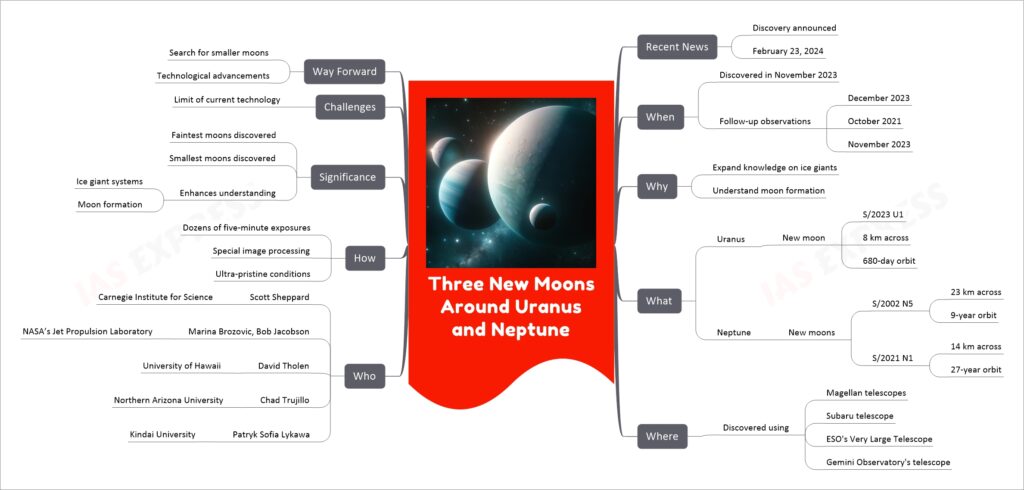
Astronomers have recently unveiled the discovery of three new moons orbiting the ice giants Uranus and Neptune. This significant finding, announced on February 23, 2024, includes one moon around Uranus and two around Neptune. The discovery was made using a series of detailed observations and advanced image processing techniques. The newly discovered Uranian moon, provisionally named S/2023 U1, is about 8 kilometers across and completes an orbit every 680 days. Neptune’s moons, designated S/2002 N5 and S/2021 N1, measure approximately 23 and 14 kilometers in diameter, respectively, with orbits lasting about 9 and 27 years. This discovery was made possible through the collaborative efforts of astronomers using some of the world’s most powerful telescopes, including the Magellan telescopes at Carnegie Science’s Las Campanas Observatory, the Subaru telescope, the European Southern Observatory’s Very Large Telescope, and the Gemini Observatory’s telescope. These celestial additions to Uranus and Neptune’s moon families enhance our understanding of the outer solar system’s dynamics and the complex processes that govern moon formation.
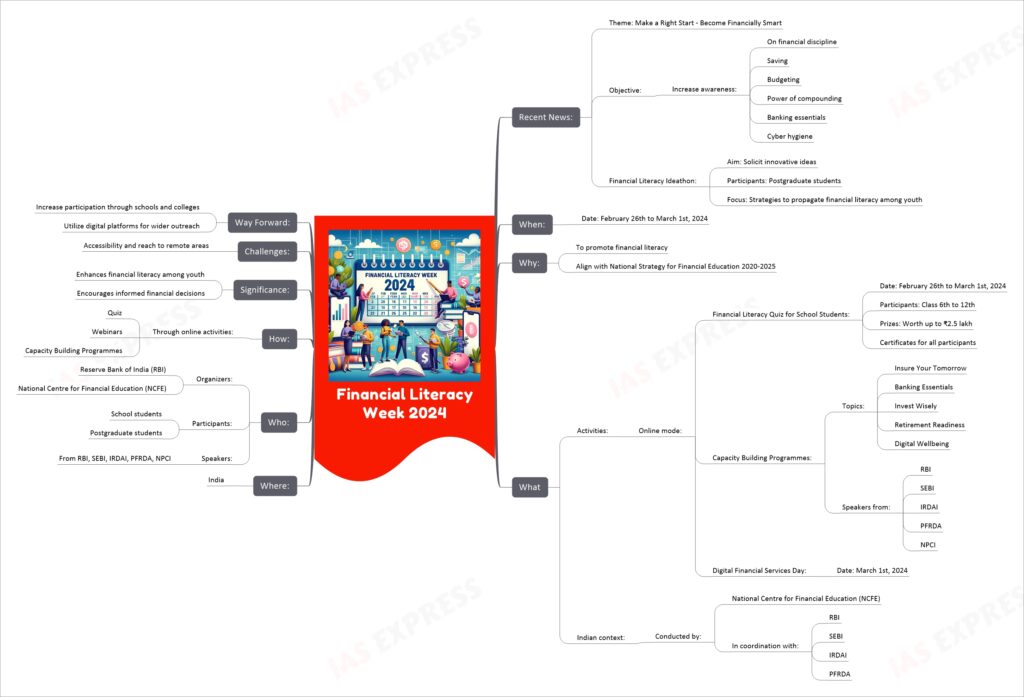
Financial Literacy Week (FLW) 2024 is a significant initiative aimed at enhancing financial literacy across India, especially among the youth. Scheduled from February 26th to March 1st, 2024, under the theme “Make a Right Start – Become Financially Smart,” FLW focuses on promoting essential financial skills such as saving, budgeting, understanding the power of compounding, banking essentials, and cyber hygiene. The week includes a variety of activities conducted online, including a financial literacy quiz for school students, capacity building programs with experts from financial regulatory bodies, and the observation of Digital Financial Services Day. Organized by the National Centre for Financial Education (NCFE) in coordination with India’s leading financial sector regulators, FLW aims to empower young Indians with the knowledge and skills needed for sound financial decisions, ultimately striving for a financially aware and empowered India.
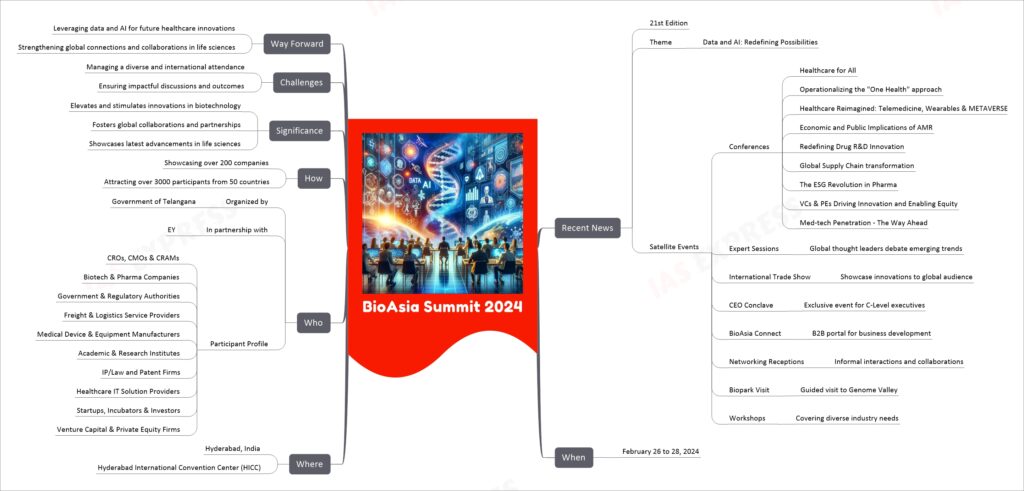
The BioAsia Summit 2024, set in Hyderabad, India, from February 26 to 28, marks its 21st edition under the theme “Data and AI: Redefining Possibilities.” This event is a pivotal gathering in the life sciences and healthcare sectors, showcasing innovative advancements and fostering international collaborations. Organized by the Government of Telangana and in partnership with EY, it promises to bring together over 3000 delegates from 50 countries, including a distinguished lineup of speakers such as David Ricks, Christopher Boerner, Geoff Martha, and Nobel Laureate Gregg Semenza, among others. The summit features a comprehensive program including conferences, expert sessions, and an international trade show, aimed at discussing and exploring the role of data-driven technologies and AI in healthcare, pharmaceuticals, and biotechnology. This event stands as a testament to the global stature of BioAsia, highlighting its role in stimulating industry growth, facilitating knowledge sharing, and promoting wellness and health innovations globally.

The amendment of the India-Mauritius Double Taxation Avoidance Agreement (DTAA) aims to address long-standing issues such as treaty abuse and round-tripping of funds, which have impacted fiscal fairness and transparency between the two nations. By incorporating provisions for source-based taxation of capital gains and interest, the amendment signifies a major shift in how investments from Mauritius into India will be taxed, aligning with global standards to combat tax evasion and enhance tax compliance. This move is expected to have significant implications for the flow of foreign direct investment (FDI) from Mauritius to India, ensuring that such flows are transparent and aligned with international tax norms.
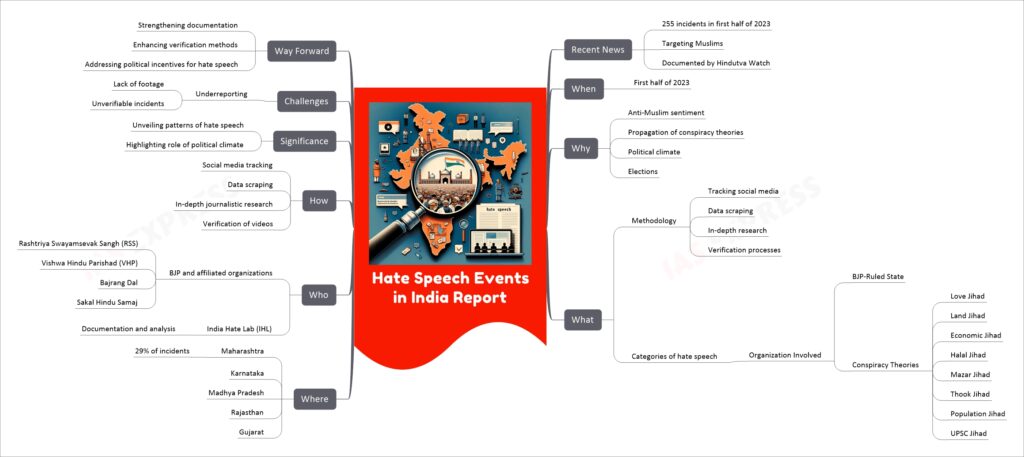
This mindmap outlines the findings and methodology of the “Hate Speech Events in India” report, focusing on the targeted anti-Muslim hate speech documented in the first half of 2023. The report, compiled by Hindutva Watch in collaboration with India Hate Lab, utilized social media tracking, data scraping, and journalistic research to verify over 255 incidents. The majority of these incidents occurred in BJP-ruled states, with significant concentrations in Maharashtra, Karnataka, Madhya Pradesh, Rajasthan, and Gujarat. The report categorizes the hate speech events by the organizations involved, including those affiliated with the BJP and the broader Sangh Parivar, and identifies the spread of various conspiracy theories as a common theme. The report emphasizes the role of the political climate and upcoming elections in exacerbating the situation, noting a deliberate effort to disseminate anti-Muslim sentiments in states with fragile electoral support.

The “Amrit Bharat Station Scheme” is an ambitious initiative by the Ministry of Railways, Government of India, launched in February 2023, aiming to transform 1309 railway stations across the country. It seeks to upgrade these stations into world-class hubs, focusing on modernizing infrastructure, improving passenger amenities, and enhancing connectivity. The scheme emphasizes the integration of sustainable and environment-friendly solutions, inclusivity for the specially-abled, and the beautification of station premises. This comprehensive redevelopment effort is poised to revolutionize the way passengers experience railway travel in India, making stations not just transit points but also vibrant city centers.
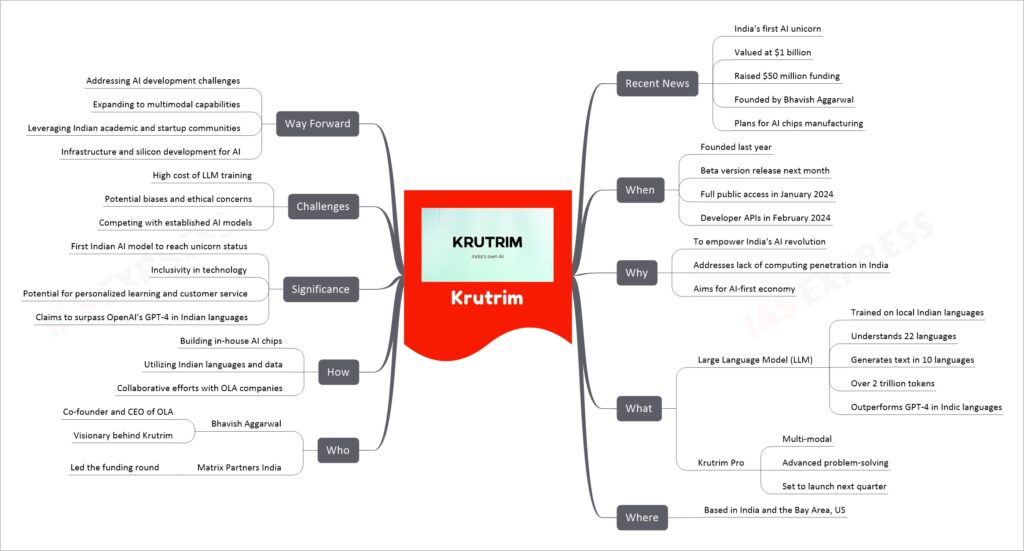
Krutrim, an AI startup founded by Bhavish Aggarwal, has emerged as India’s first AI unicorn, achieving a valuation of $1 billion with a $50 million funding round. It represents a significant step for India’s participation in the global AI landscape, aiming to revolutionize the AI market by focusing on local Indian languages and data. Krutrim’s approach includes developing a large language model that understands multiple Indian languages, plans for an AI chip manufacturing capability, and creating a multimodal advanced version named Krutrim Pro. The venture signifies India’s ambition to be an AI-first economy, addressing the existing gap in computing penetration and aiming to make technology inclusive and accessible across diverse Indian languages.
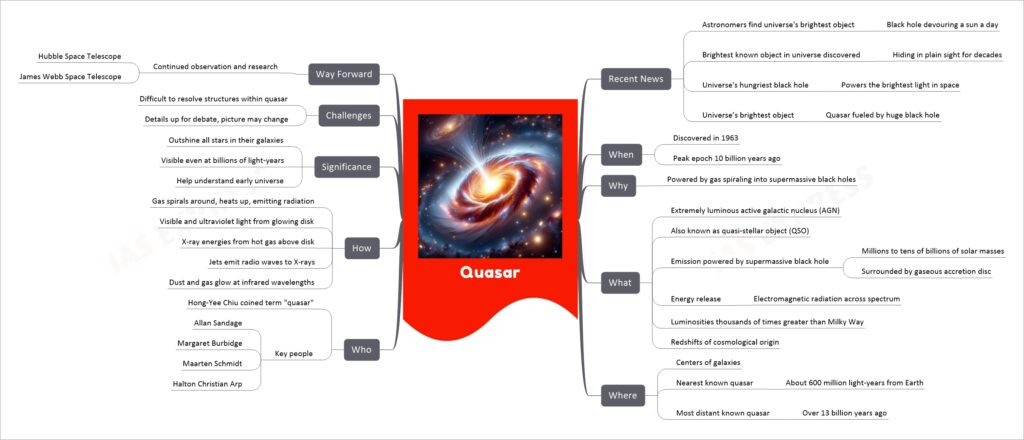
Quasars are extremely luminous objects found in the centers of some galaxies, powered by gas spiraling at high velocity into enormous black holes. They can outshine all the stars in their host galaxies, making them visible even from billions of light-years away. Quasars are not only significant for their brightness but also for what they can teach us about the early universe and the formation of galaxies. They were first discovered in the 1960s as quasi-stellar objects due to their star-like appearance and radio emissions. Since then, our understanding of quasars has evolved significantly, thanks to the advancements in astronomical observations and technologies such as the Hubble Space Telescope.
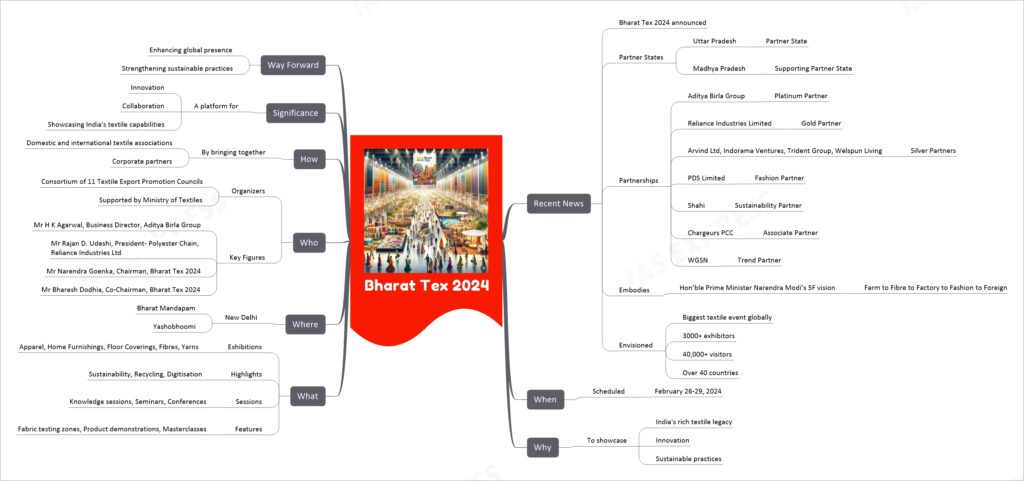
Bharat Tex 2024 is set to redefine the global textile industry with its comprehensive showcase of India’s rich textile heritage, latest technological innovations, and emphasis on sustainability. Scheduled from February 26-29, 2024, in New Delhi, it embodies the “Make in India” spirit and aims to highlight India as a prime destination for textile sourcing and investments. With over 3,000 exhibitors and 40,000+ visitors from more than 40 countries, the event stands as a testament to India’s burgeoning role on the international stage, driven by the collaboration of 11 Textile Export Promotion Councils and support from the Ministry of Textiles. This historic event, celebrating the entire textile value chain, from traditional crafts to cutting-edge innovations, aims to foster global partnerships and underscore India’s commitment to sustainable and innovative textile production.
If you like this post, please share your feedback in the comments section below so that we will upload more posts like this.
